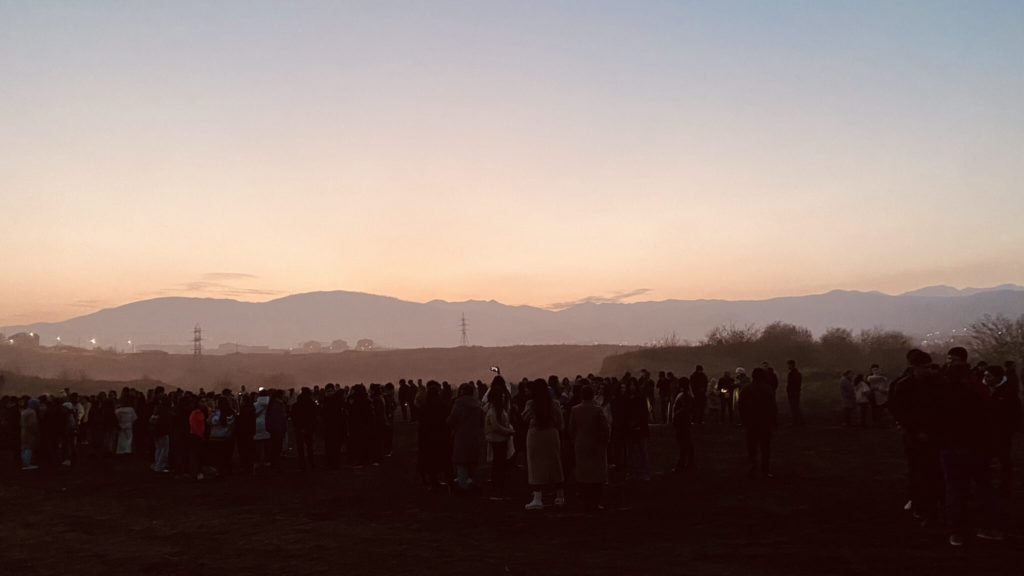
It is a precarious time for Artsakh and Armenia. The Azeris have blocked the Lachin Corridor cutting off supplies of food, fuel and medical supplies. With winter setting in and no other power stepping in to assist us, it appears the Azeris hold the upper hand. To say it is disheartening for all Armenians to have to watch this happening barely explains how horrible and helpless we are feeling. It is difficult to read or write about it.
I am not an expert, nor am I privy to any great insights, but there seems to be no military option for us. The Azeris have superior weaponry and numbers as was shown in the costly and devastating 2020 war. Unlike Ukraine, no one is coming to our aid with training and weapons. There was news a few months ago of an arms deal with India. I am guessing it is nowhere near the kind of support the US is providing to Ukraine.
Nancy Pelosi did visit Armenia in mid-September. She was the highest-ranking US official to visit the Republic of Armenia. It came at a time when Azerbaijan was making incursions into Armenia, and it looked like another war was about to start. Her visit seemed to calm the tensions until just over a week ago when Azerbaijan began this blockade. France’s Macron has recently spoken on our behalf as well.
Azerbaijan does not seem fazed by Pelosi’s visit or Macron’s words. Aliyev seems to believe that no one will come to Armenia’s aid. I shudder that he may be correct. It seems to be in no one’s interest to help us. We are small in numbers. We are not laden with natural resources, and there is nothing strategic about our location. Our immediate neighbors? Turkey and Azerbaijan are enemies. Georgia is not Armenian friendly by any means. Iran has its own issues internally and quite a large Azeri minority living there. We are in Russia’s sphere of influence, but there seems to be little hope of Russia stepping in. Putin has the war he started with Ukraine to deal with anyways. I really am not sure we can stop them, and it looks like no one is going to help us. What can we do? What can we really do? A friend of mine in Chicago posted this:
Artsakh needs you. What you can do.
- Amplify voices from Artsakh and raise awareness of the humanitarian crisis.
- Contact your representatives and demand sanctions against Azerbaijan.
- Protest, in person and online, against Azerbaijan’s attempt to ethnically cleanse Armenians from Artsakh.
Church leaders, diasporan political parties and our lobbying groups have basically encouraged us to do the same. Another friend just started a nonprofit to raise money to purchase border monitoring equipment. Their fundraising effort is to raise like $10,000. Of course, we need to do these things. Of course, I will do these things. I just worry about how useful and effective they are. It just doesn’t feel like enough. I was feeling quite grim. Then, I read Simon Maghakyan’s article in Time, History Suggests This Winter Could Be Dangerous for Armenians. His historical perspective helped turn my bleakness to a grim resolution that we can never give up. Defending our lands and people from these enemies has to be our sole focus.
Hopefully, in the short run, negotiations will work. In the longer run, we need to focus on defensive military strength. We don’t need any more congressional or parliamentary resolutions or recognitions of what happened in 1915. We need them to treat us a lot more like the West is currently treating Ukraine. We need money, modern weaponry and training to be able to defend ourselves from enemies that want to eliminate our presence in what remains of our ancestral homeland. If no one helps us in this regard, we must figure out how to do it ourselves. Our only salvation is in our collective strength… and an iron ladle.


We need the will to fight and that starts at the top. During the 44 day war, the leadership not only failed to mobilize the armed forces, but when volunteers showed up, they turned them away.